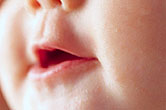- Could Your Grocery Store Meat Be Causing Recurring UTIs?
- Are You Making This Expensive Thermostat Error This Winter?
- Recognizing the Signs of Hypothyroidism
- 10 Strategies to Overcome Insomnia
- Could Artificial Sweeteners Be Aging the Brain Faster?
- Techniques for Soothing Your Nervous System
- Does the Water in Your House Smell Funny? Here’s Why
- Can a Daily Dose of Apple Cider Vinegar Actually Aid Weight Loss?
- 6 Health Beverages That Can Actually Spike Your Blood Sugar
- Treatment Options for Social Anxiety Disorder
Encouraging Your Baby’s Babbling May Speed Language Development


The way that parents respond to their infant’s babbling might affect the baby’s language development, a new study suggests.
Over six months, researchers observed the interactions between 12 mothers and their infants during free play. The sessions were 30 minutes long and happened twice a month. The infants were 8 months old at the start of the study.
When parents listened and responded to a baby’s babbling, infants began to form complex sounds. The babies whose parents responded to babbling also started using language more quickly, according to the study published recently in the journal Infancy.
Language skills developed more slowly in babies whose mothers didn’t make as much effort to understand their babbling, and instead sometimes directed their infants’ attention to something else.
The results show that parents who actively interact with their babbling baby can hasten the child’s language development, according to the researchers.
“It’s not that we found responsiveness matters. It’s how a mother responds that matters,” study corresponding author Julie Gros-Louis, an assistant professor of psychology at the University of Iowa, said in a university news release.
The study shows that “social stimulation shapes at a very early age what children attend to. And if you can show the parent can shape what an infant attends to, there is the possibility to shape what the child is sensitive to. They are learning how to learn,” study co-author Andrew King, a senior scientist in psychology at Indiana University, said in the news release.
More information
The American Speech-Language-Hearing Association has more about speech and language development.
Source: HealthDay
Copyright © 2026 HealthDay. All rights reserved.










